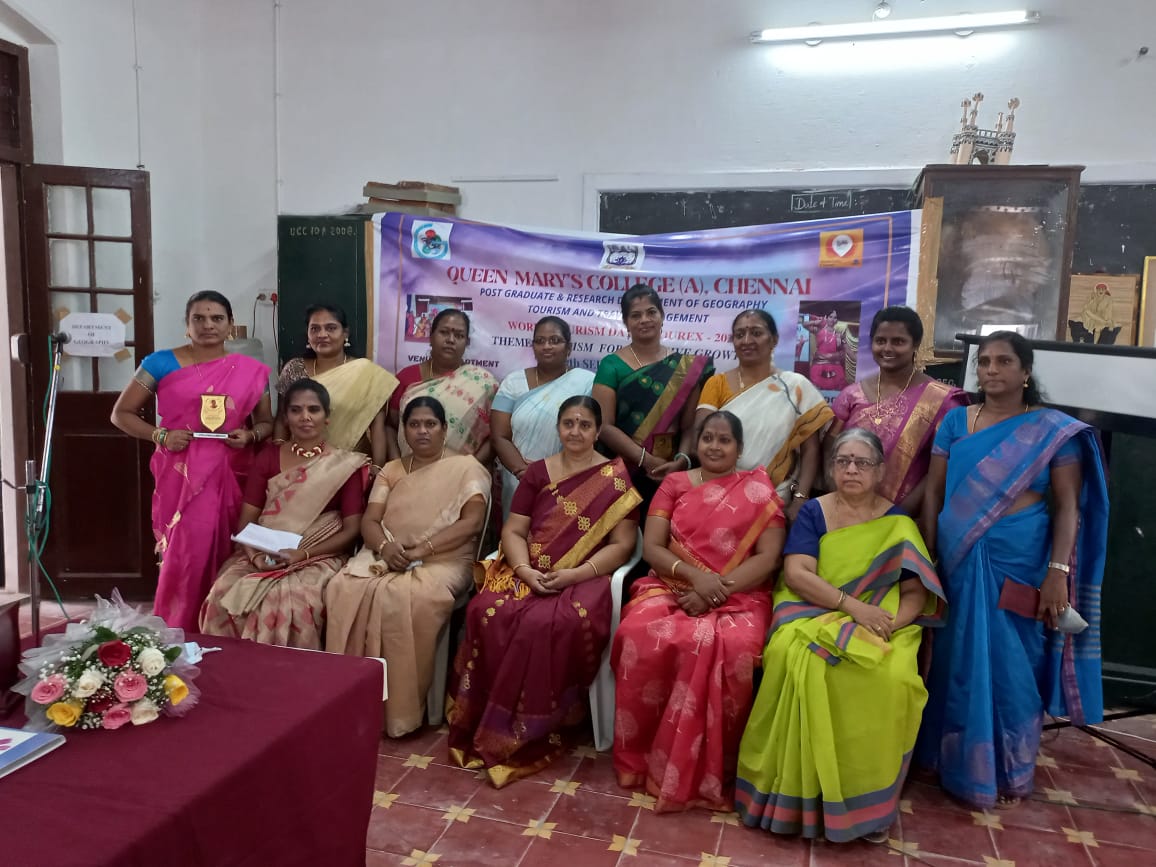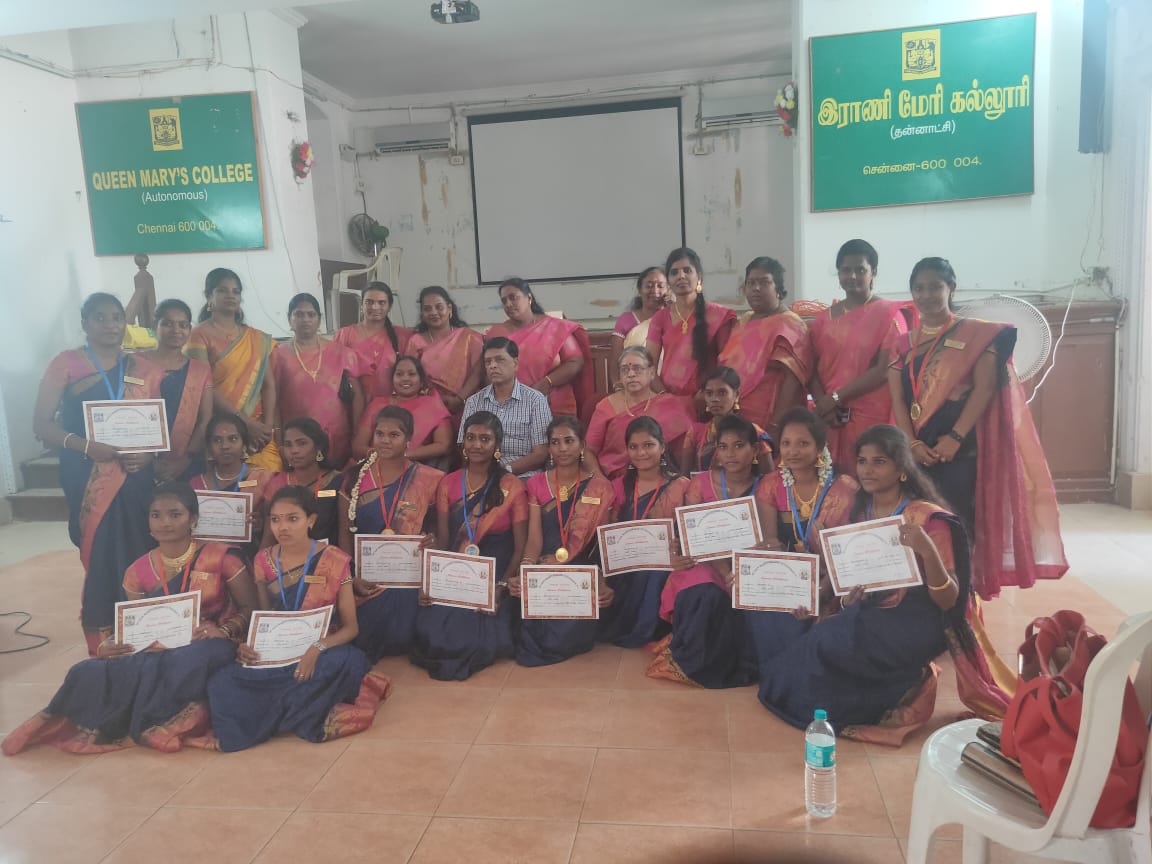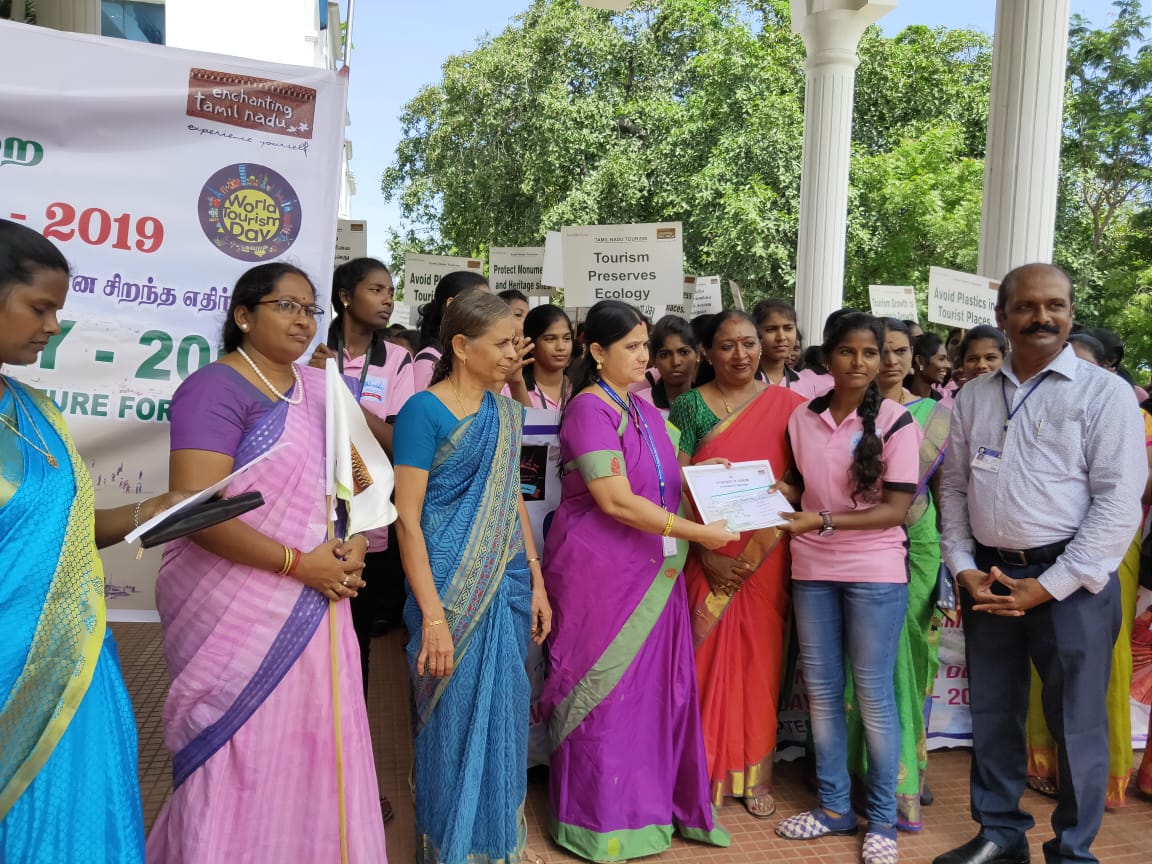About Department
Department of Geography - Queen Mary's College
The Department of Geography at Queen Mary's College is one of the oldest and most prestigious departments in the institution. Established in 1916 as a subject, the department has grown and evolved significantly over the years.
Undergraduate and Postgraduate Course:
Geography was offered as a graduate course in 1941, and later as a Postgraduate course in 1958. The department began its journey by focusing on providing a strong foundational understanding of geographical concepts and practices.
Research Department:
In the academic year 1994-1995, the Department of Geography was upgraded to a Research Department, offering both M.Phil. and Ph.D. programs, marking its commitment to advancing knowledge in the field.
Unique Dual Courses:
The Department of Geography at Queen Mary's College stands out among government colleges in Tamil Nadu for offering two courses simultaneously at both the UG and PG levels: Geography and Tourism. This dual offering provides students with the flexibility to explore both traditional and modern aspects of the field, preparing them for a wide range of careers.
Medium of Instruction:
The UG Geography course is available in both English and Tamil, ensuring accessibility and catering to the diverse linguistic needs of the student body.
Faculty Expertise:
The department's staff members are highly qualified, with many holding Doctorates and M.Phil. degrees, and several are SLET/NET qualified. The faculty specializes in various subfields of Geography, including:
Medical Geography
Urban Geography
Water Resources Management
Digital Cartography (GIS and Remote Sensing)
Tourism and the Aviation Industry
With its rich history and diverse academic offerings, the Department of Geography continues to provide students with the knowledge and skills necessary for both academic success and practical application in the fields of Geography and Tourism.
History
The Department of Geography at Queen Mary’s College holds the distinction of being one of the oldest and most esteemed departments within the institution. Established in 1916 as a subject, the department laid the foundation for academic excellence in the field of geography. It soon evolved and was introduced as a graduate course in 1941, offering students an opportunity to pursue higher education in this essential discipline.
In 1958, the department further expanded its offerings with the introduction of a Postgraduate program, enabling students to gain advanced knowledge and expertise in geography. The continuous growth and development of the department culminated in 1994-1995, when it was upgraded to a research department, incorporating M.Phil and Ph.D. programs. This marked a significant milestone in the department's journey, establishing it as a hub for academic research and innovation in geography.
In 2016, the department proudly celebrated its centenary, marking 100 years of excellence in education and research. The centenary celebrations, held on 27th September 2016, commemorated a rich history of academic achievement and the department's contribution to the advancement of geographical knowledge.
Today, the Department of Geography at Queen Mary’s College continues to thrive, offering undergraduate, postgraduate, and research programs, while remaining committed to fostering academic growth and contributing to the field of geography on a global scale.
Vision
The Department of Geography's Main Vision is "To empower students and researchers through innovative teaching, interdisciplinary learning, and application of geospatial technologies to address real-world challenges."
Mission
Mission 1: Promote Academic Excellence
To provide students with a high-quality education in Geography, combining theoretical knowledge with practical applications to enhance their understanding of the physical, environmental, and human aspects of the world.
Mission 2: Enhance Research and Innovation
To foster cutting-edge research in Geography, encouraging faculty and students to explore diverse topics, from environmental sustainability to urban planning, contributing to both national and global discourse.
Mission 3: Develop Technological Competency
To integrate modern technology, including Geographic Information Systems (GIS), remote sensing, and spatial analysis tools, into the curriculum and research projects, equipping students with critical skills for the evolving job market.
Mission 4: Expand Student Learning Opportunities
To offer a variety of field-based learning experiences, workshops, and internships, allowing students to apply theoretical knowledge in real-world scenarios such as urban planning, environmental conservation, and disaster management.
Courses Offered
Programme Outcome
Undergraduate Program in Geography (UG Geography)
Program Outcome: The UG program in Geography aims to:
Develop Strong Conceptual Knowledge:
Equip students with in-depth understanding of core geographical concepts, theories, and principles.
Enhance Communication Skills:
Foster strong communication skills through regular seminars, group discussions, and presentations.
Promote Technological Proficiency:
Ensure students become digitally conversant, with a focus on using digital tools for presentations, mapping, and data analysis.
Cultivate Analytical and Problem-Solving Abilities:
Encourage students to think critically and analytically, preparing them to solve real-world geographical problems.
Instill a Quest for Lifelong Learning:
Develop a passion for continuous learning and inquiry into new geographical and environmental challenges.
Encourage Systematic Learning:
Provide ample opportunities for systematic, discipline-specific learning, ensuring students have a thorough academic foundation.
Undergraduate Program in Geography, Tourism, and Travel Management (UG Geography and Tourism)
Program Outcome: The UG program in Geography, Tourism, and Travel Management aims to:
Basic Tour Administration Skills:
Equip students with essential skills in tour administration, including planning, organization, and management of travel experiences.
Technological Skills for the Tourism Industry:
Develop proficiency in using technological tools to address challenges in the tourism industry, including GIS and digital booking systems.
Industry-Ready Graduates:
Prepare students to face the dynamic challenges of the tourism industry with a strong foundation in geographical concepts and travel management.
Postgraduate Program in Geography (PG Geography)
Program Outcome: The PG program in Geography aims to:
Advanced Knowledge in Geography:
Provide students with advanced, specialized knowledge of geographical concepts, techniques, and methodologies.
Enhanced Communication and Networking:
Develop excellent communication skills through participation in internships, seminars, and conferences, fostering professional networking.
Expertise in Geospatial Technologies:
Ensure students are proficient in advanced geospatial technologies, including GIS and remote sensing, preparing them for high-level geographical analysis.
Critical Thinking and Problem-Solving:
Encourage advanced analytical skills, helping students tackle complex geographical problems and contribute to innovative solutions.
Postgraduate Program in Geography and Tourism Administration (PG Geography and Tourism)
Program Outcome: The PG program in Geography and Tourism Administration aims to:
Understanding the Interdisciplinary Linkages:
Provide students with a deep understanding of the relationship between geographical concepts and tourism administration.
Entrepreneurial Skills in Tourism:
Equip students with the necessary skills to become entrepreneurs in the tourism industry, such as tour operators, travel agents, and guides.
Hands-on Experience in Event Management:
Offer practical opportunities to work in event management, such as participation in the organization of the World Tourism Day, enabling students to experience the real-world application of tourism concepts.
Industry-Specific Knowledge and Innovations:
Help students identify emerging trends, challenges, and innovations in the hospitality, aviation, international travel, formalities, and tourism marketing sectors.
Practical Skills in Travel Operations:
Ensure students gain practical experience in essential tasks such as booking transportation (bus, train, flight) and accommodations, preparing them for real-world tourism management.
Mastery of Tourism Technologies:
Provide proficiency in the latest ICT tools for tourism technology, including GIS applications for mapping and spatial data analysis in tourism contexts.





